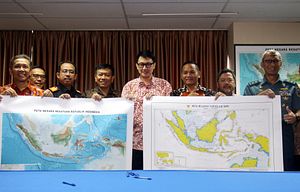Last week, media outlets began disclosing that China’s Foreign Ministry had sent a note dated August 25 to the Indonesian Embassy in Beijing opposing Jakarta’s decision in July to rename its portion of the South China Sea to the North Natuna Sea. Despite the hype surrounding the note, it represents just the latest sign of China’s well-known and predictable displeasure at Indonesia’s decision to protect its maritime interests lawfully in response to Beijing’s recent assertiveness in the South China Sea.
Though Indonesia is technically not a claimant to the South China Sea disputes strictly speaking – a point its diplomats are keen to emphasize – in reality, as I have noted before, it has nonetheless been effectively an interested party, especially since China’s nine-dash line overlaps with Indonesia’s exclusive economic zone (EEZ) around the resource-rich Natuna Islands.
Given the balance that Indonesia has had to walk, the South China Sea position Jakarta has adopted since the 1990s might be best summed up as what I have termed a “delicate equilibrium” – seeking to both engage China diplomatically on the issue and enmeshing Beijing and other actors within regional institutions (a softer edge of its approach, if you will) while at the same time pursuing a range of security, legal, and economic measures designed to protect its own interests (a harder edge) (See: “Indonesia’s South China Sea Policy: A Delicate Equilibrium”).
Though China’s growing maritime assertiveness in the South China Sea – which, quite apart from initiating any sort of “cooling down period,” includes a string of actions from continuing to trumpet its nine-dash line to infringing into the waters of Southeast Asian states to pressuring regional and extraregional states to cease their perceived ‘intervention’ into the South China Sea issue – has not led to a fundamental change in Indonesia’s long-held policy for various reasons thus far, there have been signs of recalibration as Jakarta has sought to do what it can to protect its interests (See: “Will Indonesia’s South China Sea Policy Change Amid China’s Assertiveness?”).
Indonesia’s stance following run-ins with Chinese vessels, its upgrading of facilities in the Natunas, visits by Jokowi to the area, and Jakarta’s North Natuna Sea renaming, are all examples of this broader trend (See: “Why Did Indonesia Just Rename its Part of the South China Sea?”). They are specific actions designed to signal to China and other states that Indonesia intends to secure its own interests with respect to this issue even as it, like other Southeast Asian states seeks closer ties with Beijing in other areas.
With respect to the North Natuna Sea renaming, China’s temper tantrum – which Indonesian diplomats say has been expressed through several ways including the recent diplomatic note – has been predictable. Beijing has a habit of coercing other claimants, regional, and extraregional states over the South China Sea issue through a wide range of measures, from instituting economic limits to exports of certain products to canceling diplomatic engagements to either routinely or sporadically sending vessels into the waters of neighboring states to make its point (See: “Will a China-ASEAN South China Sea Code of Conduct Really Matter?”). Seen from this perspective, China’s suggestion in its recent diplomatic note that the renaming complicates and expands the dispute and affects peace and stability is nothing new.
And besides, even a cursory examination would demonstrate that China’s huffing and puffing over the North Natuna Sea renaming is much ado about very little. Unlike Beijing’s nine-dash line and its refusal to adhere to the arbitral tribunal ruling on the Philippines’ South China Sea case issued in 2016, Jakarta’s outlining of the steps it is taking in the renaming – including steps like registering it with the International Hydrographic Organization (IHO) – have so far been completely in line with international law.
Indonesia is also just the latest among Southeast Asian states to move forward with this designation (the Philippines already calls the South China Sea the West Philippine Sea, and Vietnam refers to it as the East Sea). And though Jakarta has publicly stated that there are several reasons behind this name change, considering that China’s assertiveness in the South China Sea has clearly been a key reason for Jakarta’s move, Beijing only has itself to blame for this. It is just another example of how Chinese assertiveness is leaving Southeast Asian states with little choice but to initiate countermeasures in response to protect their own interests while becoming even more aware of the challenges posed by Beijing’s rise even as the opportunities continue to be clear as well (See: “New White Paper, Old Asia Conundrum”).
Thus, it is quite clear that Beijing’s suggestion in its recent note that Indonesia is undermining “peace and stability” and jeopardizing Sino-Indonesian ties and progress on the South China Sea issue does not pass the smell test. As one Indonesian source told The Diplomat, though there might be a debate as to the positions of various sides, “we can at least be clear about sequences of events here.”
Lastly, despite expressing its clear displeasure at Indonesia’s renaming, China is also no doubt aware that moves like these do little to alter the balance of power that remains massively in its favor. Though legal moves like this one are important signaling devices in and of themselves as they convey the commitment of states to the very international laws Beijing is violating, they alone cannot stop China’s assertiveness unless they are paired with actions in other areas as well, including in the military and even the economic realm (See: “Beware the Illusion of South China Sea Calm”). And the reality is that Indonesia’s military capabilities remain quite limited, and Jakarta has refrained from taking firmer steps to confront Beijing because of the Jokowi government’s desire to preserve cooperation in other areas. We have seen few signs of this changing anytime soon.
































